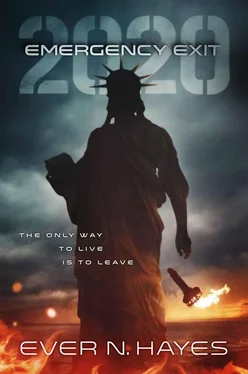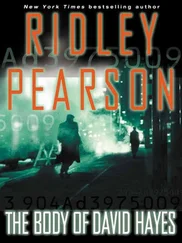For most of us, this would be the first Thanksgiving in decades without actual turkey—not sure there’s any in turkey jerky—the first time we wouldn’t have to fight a tryptophan-induced nap while pretending to care about another Lions loss.
This week had always been the nation’s biggest shopping week, with Marigold Monday, Technicolor Tuesday, Whiteout Wednesday, and Black Friday. Retail lost respect for Thanksgiving and family time nearly a decade ago. The entire week had since morphed into one long drawn-out Black Friday. This was the week people who didn’t need anything went out in droves, at all hours, to buy it. I certainly didn’t miss the chaos. Quite frankly, it was a valid reason why the rest of the world wouldn’t miss America. Sometimes we acted like idiots!
Then again, in times like these, a little materialism was a helpful and welcome convenience. We had a small television, powered by another big battery, in the back room of the cave mostly for Emily’s entertainment, with hundreds of kid-friendly DVDs. And we had our shortwave radio. We hadn’t picked up any new messages, but that didn’t keep us from trying to find one.
Grandpa Dan attached a forty-eight-inch monitor to the wall next to the front entrance of the cave. From it we ran a wire through a small hole in the base of the entrance, through a deep but narrow trench, and up the inside of a tall hollowed-out tree. Cameron climbed the tree one night and attached two quarter-sized, high-tech cameras to the highest point he could reach. Valuable gifts from Wes . Both had infrared capability and incredible night vision resolution. One pointed toward the entrance to the cave, giving us a wide-angle view of the area within sixty or so yards of the entrance. The other was a remote-controlled camera panning from the waterfall immediately to our right—150 yards or so away—to the limits of the Endovalley base—below us, and a mile to the right—all the way over towards Estes Park. The screen and cameras were powered by their own battery source, and each camera view took up half the screen on the monitor. That was the extent of our exterior security. No one was going to find those cameras. Other than maybe a vengeful squirrel .
Our initial suspicion was that the men below us were Captain Eddie’s. He knew we were up here somewhere. Surely he’d regrouped, assembled a small army, and managed to get his men stationed here.
After a couple nights and early mornings of scouting, Danny determined that wasn’t the case. There was no sign of the giant captain. The troop below seemed to be entirely from the Middle East. No Africans. While that news, in and of itself, was cause for some relief, it did beg the question: Where was Eddie?
FORTY-ONE: “The New America”
After several weeks of frenetic construction, the new Qi Jia government had fortified and completely shut off Colorado from the other states. The Great Wall of Colorado was rapidly nearing completion. Huge iron gates were set up at every main entry road into the state. Smaller roads were redirected along the walls to the larger entrances and anywhere from twenty to forty soldiers were encamped at each gate.
Qi Jia set up its command headquarters in Denver. They hadn’t been able to penetrate NORAD in Colorado Springs, but there had been no missile activity there. Either there was no one inside, or there were no missiles left to fire. Qi Jia’s forces had wired all the area silo openings with explosives, just in case. If they were opened, they would blow up whatever was inside, providing an entry into the otherwise impenetrable Cheyenne Mountain Bunker tunnels. Beyond NORAD, there was no threat to the Denver command center. No one anywhere else in the world would be able to attack without it being visible from far away. Any launched attack would first have to make it past Qi Jia’s missile and military posts up and down the coastlines, as well as across the northern and southern borders of the former U.S. The Seven commanders didn’t believe there was a force still out there in the world with this capability. They were permanently secure in Colorado, and this fortress, here in the middle of America, was the idyllic perch to rule from.
Qi Jia’s troops had completed two tours back and forth across each state and a large portion of Canada. Qi Jia had no real interest in Canada, but went five hundred miles north of the border in their sweep to cut off any fleeing Americans and wipe out whatever residential presence remained. Their men pushed up towards Alaska where they met up with the Russians. The Russians had come in from the west and worked their way south and east. When the two forces met they each turned back. The Qi Jia army headed south towards Denver and the Russian forces spread out across the former state of Alaska.
Most of Qi Jia’s naval fleet had been assembled down the former Southern California and Baja coastlines. That fleet consisted of preserved American ships—a half-dozen destroyers, an aircraft carrier, and a few dozen former Coast Guard vessels. The third wave claimed hundreds of thousands of casualties on the American side. Impressively few from the Qi Jia army. The entire plan had been executed nearly flawlessly. In America at least. The same couldn’t be said for back home. Other than Mexico, the native lands of The Seven commanders weren’t at all supportive.
Word had spread rapidly across the continents of what these seven leaders had done, and most of the world was furious. Qi Jia’s attack on America would have been hard enough to endorse on its own. The United States’ commitment to assisting the needy was generally and genuinely appreciated by many nations. America’s defensive countermeasures were understandable, but had tragically decimated the planet. And it was that decimation that had the planet vowing to cut off the seven commanders. They had sacrificed a billion innocent lives selfishly and unapologetically. That was unacceptable. The commanders and their men were now outcasts, powerless back home, and would be imprisoned or killed if they ever tried to return to their native countries. That, admittedly, was an unfortunate result to the Qi Jia commanders. They had incorrectly anticipated having more support from the countries America hit back. But, in truth, it was also inconsequential. The commanders had no intent of returning to their homelands, or allowing any of their men to do so. Thanks to America’s counterattack there were no countries on the planet with nuclear arsenals or military numbers greater than theirs was here. This was their home now. North America was all theirs.
While true that there were no stronger forces left in the world, there were a few countries that were not targeted by any of the attacks or counterattacks. The United States still had a few strong military allies in the United Kingdom, France, Brazil and Australia. Those nations began immediately broadcasting to any American tourists—or survivors who could escape—that they would be granted asylum and even dual citizenship in their countries. Israel, the United Arab Emirates and even Switzerland had similarly pledged their financial support to surviving Americans. So much for neutrality, eh? Qi Jia couldn’t afford for their own troops to know about the sentiments back home. It could easily divide the ranks and derail the grand agenda.
Qi Jia had successfully managed to take over the entire American communication grid. From Denver they controlled every message on the airwaves. They had traced a few military codes to a remote part of Montana and killed the source. No one in America was going to be telling their soldiers, or any remaining Americans, any message other than the one The Seven commanders wanted out there. “We are almost done. America must pay for killing our families. Keep up the great work!”
Читать дальше












